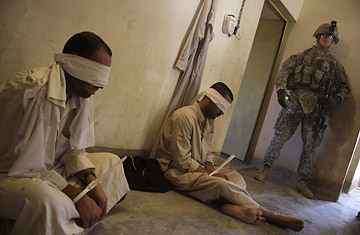
A U.S. soldier guards two blindfolded detainees in Khashwaga's village, 28 miles (45 km) southwest of Kirkuk in northern Iraq, on June 5
The volleyballs often get stuck in the razor wire atop the prisoner pens in Camp Cropper, a U.S. military detention facility just outside Baghdad. The Iraqi detainees love to play and are quite good, their American keepers say. Volleyball is one of the few leisure pastimes of the roughly 22,000 Iraqis in U.S. military internment in Iraq. U.S. soldiers hold about 3,000 Iraqis, arrested on suspicion of insurgent or militia activity, at Camp Cropper, chiefly a way station for prisoners that sits amid the labyrinthine military complex sprawling around Baghdad International Airport. The bulk of the U.S. detainee population is at an American base near Basra called Camp Bucca, the largest military internment facility in the world. Custody of all these detainees is at the heart of an intractable dispute over the nature of Iraqi sovereignty.
The current U.N. mandate that allows the U.S. to operate in Iraq finishes at the end of the year and is set to be replaced by a long-term bilateral agreement between the U.S. and Iraq. Negotiators from the two countries, however, face a number of difficult issues, such as the duration of U.S. military bases on Iraqi territory and the legal status of U.S. security contractors, who are currently immune from Iraqi law. Except for the detainee question, however, most of the issues under discussion have some plausible compromise modeled on protocols with other countries where large numbers of U.S. troops are present.
U.S. troops, for instance, are not subject to local laws in any of the countries where they are stationed, an arrangement okayed by unquestionably sovereign countries such as Germany, Japan, South Korea and Italy. Iraqi decision makers are likely to agree to the same, despite some vociferous objections in the Parliament, which must ratify any deal negotiated by the government. The question over possible immunity for security contractors is more sensitive in light of Iraqi civilian deaths at the hands of gunmen from Western firms like Blackwater. But the granting of immunity by elected governments for certain foreign nationals in their country is common enough throughout the world that it seems Iraqi and American negotiators could find some formulation of the practice to work here.
Yet it's difficult to imagine Germany, Japan or South Korea allowing U.S. troops to arrest and detain its citizens indefinitely, a practice American forces say they must continue in Iraq to ensure stability. "Detention is a very strategic part of the overall counterinsurgency program," says Lieut. Colonel Rod Faulk, one of the top American officers overseeing the U.S. detainee facilities in Iraq. "How did they become a detainee? Well, it's probably because coalition forces or Iraqis found them doing something they should not have been doing. And so now they are a security threat, and we need to remove them from the battlefield to support stability and support operations as the government of Iraq builds its society."
Faulk and other U.S. officials stress that keeping suspected insurgents and militia operatives off the streets is only part of the role detention serves. Inside, detainees are offered voluntary classes in subjects ranging from mathematics to civics. There are work programs that teach detainees carpentry and other skills in the hope that they will emerge more eager and more able to make a living and therefore avoid lures toward insurgent and militia activity. Detainees in U.S. custody even receive the same medical care provided to U.S. troops, a far better deal than a prisoner is likely to get if held in an Iraqi jail. But, as wards of the American government, the detainees lack access to Iraqi courts, where the cases against them may be heard by fellow countrymen of the supposedly sovereign Iraq. Instead, detainees must convince a military panel that they pose no threat if released. For most Iraqis who enter U.S. detention, that process takes about a year.
There are no signs that U.S. military leaders are willing to relinquish control of their detainee population, which has been declining somewhat in recent months. U.S. military officials say they are taking in about 30 new detainees a month while releasing roughly 50, a trend they expect to continue until the U.S. detainee population lowers to about 15,000 by the end of 2008. Beyond that, U.S. officials say, the way forward is unclear. But U.S. officials appear likely to press for continued authority to detain at will Iraqi nationals in the name of security.
How a resolution to this fundamental dispute over the meaning of sovereignty can be reached remains murky to Iraqi officials with a voice in the debate. "The detainee issue is one of the most important that will be discussed," says Abdul Kaliq Zangana, a parliamentarian with the Kurdish bloc. "I'm sure that our negotiators will reach an agreement that satisfies both sides." Wahil Abdul Latif, an independent parliamentarian, is less optimistic. Says he: "Everybody knows that America, as the superpower, will make its own terms." With reporting by Mazin Ezzat
